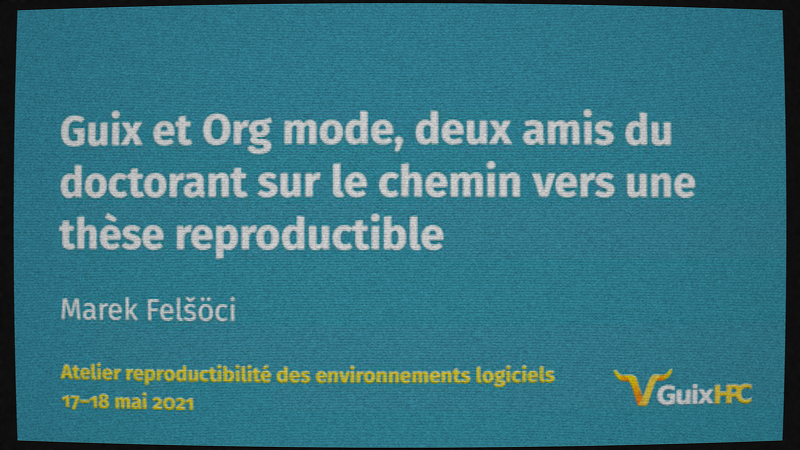Last week, we at Guix-HPC published videos of
a workshop on reproducible software
environments
we organized on-line. The videos are well worth watching—especially if
you’re into reproducible research, and especially if you speak French or
want to practice. This post, though, is more of a meta-post: it’s about
how we processed these videos. “A workshop on reproducibility ought to
have a reproducible video pipeline”, we thought. So this is what we
did!
From BigBlueButton to WebM
Over the last year and half, perhaps you had the “opportunity” to
participate in an on-line conference, or even to organize one. If so,
chances are that you already know
BigBlueButton (BBB), the free software
video conferencing suite initially designed for on-line teaching. In a
nutshell, it allows participants to chat (audio, video, and keyboard),
and speakers can share their screen or a PDF slide deck. Organizers can
also record the session.
BBB then creates a link to recorded sessions with a custom JavaScript
player that replays everything: typed chat, audio and video (webcams),
shared screens, and slide decks. This BBB replay a bit too rough though
and often not the thing you’d like to publish after the conference.
Instead, you’d rather do a bit of editing: adjusting the start and end
time of each talk, removing live chat from what’s displayed (which
allows you to remove info that personally identifies participants,
too!), and so forth. Turns out this kind of post-processing is a bit of
work, primarily because BBB does “the right thing” of recording each
stream separately, in the most appropriate form: webcam and screen
shares are recorded as separate videos, chat is recorded as text with
timings, slide decks is recorded as a bunch of PNGs plus timings, and
then there’s a bunch of XML files with metadata putting it all together.
Anyway, with a bit of searching, we quickly found the handy
bbb-render tool, which can
first
download
all these files and then
assemble
them using the Python interface to the GStreamer Editing Services
(GES).
Good thing: we don’t have to figure out all these things; we “just” have
to run these two scripts in an environment with the right dependencies.
And guess what: we know of a great tool to control execution
environments!
A “deployment-aware Makefile”
So we have a process that takes input files—those PNGs, videos, and XML
files—and produces output files—WebM video files. As developers we
immediately recognize a pattern and the timeless tool to deal with it:
make. The web already seems to
contain countless BBB post-processing makefiles (and shell scripts,
too). We were going to contribute to this while we suddenly realized
that we know of another great tool to express such processes: Guix!
Bonus: while a makefile would address just the tip of the
iceberg—running bbb-render—Guix can also take care of the tedious task
of deploying the right environment to run bbb-render in.
What we did was to write some sort of a deployment-aware makefile.
It’s still a relatively unconventional way to use Guix, but one that’s
very convenient. We’re talking about videos, but really, you could use
the same approach for any kind of processing graph where you’d be
tempted to just use make.
The end result here is a Guix
file
that returns a manifest—a list of videos to “build”. You can build
the videos with:
guix build -m render-videos.scm
Overall, the file defines a bunch of functions (procedures in
traditional Scheme parlance), each of which takes input files and
produces output files. More accurately, these functions returns objects
that describe how to build their output from the input files—similar
to how a makefile
rule
describes how to build its target(s) from its prerequisite(s). (The
reader familiar with functional programming may recognize a monad here,
and indeed, those build descriptions can be thought of as monadic values
in a hypothetical “Guix build” monad; technically though, they’re
regular Scheme values.)
Let’s take a guided tour of this 300-line file.
Rendering
The first
step
in this file describes where bbb-render can be found and how to run it
to produce a GES “project” file, which we’ll use later to render the
video:
(define bbb-render
(origin
(method git-fetch)
(uri (git-reference (url "https://github.com/plugorgau/bbb-render")
(commit "a3c10518aedc1bd9e2b71a4af54903adf1d972e5")))
(file-name "bbb-render-checkout")
(sha256
(base32 "1sf99xp334aa0qgp99byvh8k39kc88al8l2wy77zx7fyvknxjy98"))))
(define rendering-profile
(profile
(content (specifications->manifest
'("gstreamer" "gst-editing-services" "gobject-introspection"
"gst-plugins-base" "gst-plugins-good"
"python-wrapper" "python-pygobject" "python-intervaltree")))))
(define* (video-ges-project bbb-data start end
#:key (webcam-size 25))
"Return a GStreamer Editing Services (GES) project for the video,
starting at START seconds and ending at END seconds. BBB-DATA is the raw
BigBlueButton directory as fetched by bbb-render's 'download.py' script.
WEBCAM-SIZE is the percentage of the screen occupied by the webcam."
(computed-file "video.ges"
(with-extensions (list (specification->package "guile-gcrypt"))
(with-imported-modules (source-module-closure
'((guix build utils)
(guix profiles)))
#~(begin
(use-modules (guix build utils) (guix profiles)
(guix search-paths) (ice-9 match))
(define search-paths
(profile-search-paths #+rendering-profile))
(for-each (match-lambda
((spec . value)
(setenv
(search-path-specification-variable
spec)
value)))
search-paths)
(invoke "python"
#+(file-append bbb-render "/make-xges.py")
#+bbb-data #$output
"--start" #$(number->string start)
"--end" #$(number->string end)
"--webcam-size"
#$(number->string webcam-size)))))))
First it defines the source code location of bbb-render as an
“origin”.
Second, it defines rendering-profile as a
“profile”
containing all the packages needed to run bbb-render’s make-xges.py
script. The specification->manifest procedure creates a manifest
from a set of packages specs, and likewise specification->package
returns the package that matches a given spec. You can try these things at
the guix repl
prompt:
$ guix repl
GNU Guile 3.0.7
Copyright (C) 1995-2021 Free Software Foundation, Inc.
Guile comes with ABSOLUTELY NO WARRANTY; for details type `,show w'.
This program is free software, and you are welcome to redistribute it
under certain conditions; type `,show c' for details.
Enter `,help' for help.
scheme@(guix-user)> ,use(guix profiles)
scheme@(guix-user)> ,use(gnu)
scheme@(guix-user)> (specification->package "[email protected]")
$1 = #<package [email protected] gnu/packages/guile.scm:139 7f416be776e0>
scheme@(guix-user)> (specifications->manifest '("guile" "gstreamer" "python"))
$2 = #<<manifest> entries: (#<<manifest-entry> name: "guile" version: "3.0.7" …> #<<manifest-entry> name: "gstreamer" version: "1.18.2" …> …)
Last, it defines video-ges-project as a function that takes the BBB
raw data, a start and end time, and produces a video.ges file. There
are three key elements here:
computed-file
is a function to produce a file, video.ges in this case, by
running the code you give it as its second argument—the recipe,
in makefile terms.- The recipe passed to
computed-file is a
G-expression
(or “gexp”), introduced by this fancy #~ (hash tilde) notation.
G-expressions are a way to stage code, to mark it for eventual
execution. Indeed, that code will only be executed if and when we
run guix build (without --dry-run), and only if the result is
not already in the
store. - The gexp refers to
rendering-profile, to bbb-render, to
bbb-data and so on by escaping with the #+ or #$ syntax
(they’re equivalent, unless doing cross-compilation). During
build, these reference items in the store, such as
/gnu/store/…-bbb-render, which is itself the result of “building”
the origin we’ve seen above. The #$output reference corresponds
to the build result of this computed-file, the complete file name
of video.ges under /gnu/store.
That’s quite a lot already! Of course, this real-world example is
more intimidating than the toy examples you’d find in the manual, but
really, pretty much everything’s there. Let’s see in more detail at
what’s inside this gexp.
The gexp first imports a bunch of helper modules with build
utilities
and tools to manipulate profiles and search path environment variables.
The for-each call iterates over search path environment
variables—PATH, PYTHONPATH, and so on—, setting them so that the
python command is found and so that the needed Python modules are
found.
The with-imported-modules form above indicates that the (guix build utils) and (guix profiles) modules, which are part of Guix, along
with their dependencies (their closure), need to be imported in the
build environment. What about with-extensions? Those (guix …)
module indirectly depend on additional modules, provided by the
guile-gcrypt package, hence this spec.
Next comes the
ges->webm
function which, as the name implies, takes a .ges file and produces a
WebM video file by invoking ges-launch-1.0. The end result is a video
containing the recording’s audio, the webcam and screen share (or slide
deck), but not the chat.
Opening and closing
We have a WebM video, so we’re pretty much done, right? But… we’d also
like to have an opening, showing the talk title and the speaker’s name,
as well as a closing. How do we get that done?
Perhaps a bit of a sledgehammer, but it turns out that we chose to
produce those still images with LaTeX/Beamer, from
these
templates.
We need again several processing steps:
- We first define the
latex->pdf
function that takes a template .tex file, a speaker name and
title. It copies the template, replaces placeholders with the
speaker name and title, and runs pdflatex to produce the PDF. - The
pdf->bitmap
function takes a PDF and returns a suitably-sized JPEG. image->webm
takes that JPEG and invokes ffmpeg to render it as WebM, with the
right resolution, frame rate, and audio track.
With that in place, we define a sweet and small function that produces
the opening WebM file for a given talk:
(define (opening title speaker)
(image->webm
(pdf->bitmap (latex->pdf (local-file "opening.tex") "opening.pdf"
#:title title #:speaker speaker)
"opening.jpg")
"opening.webm" #:duration 5))
We need one last function,
video-with-opening/closing,
that given a talk, an opening, and a closing, concatenates them by
invoking ffmpeg.
Putting it all together
Now we have all the building blocks!
We use
local-file
to refer to the raw BBB data, taken from disk:
(define raw-bbb-data/monday
;; The raw BigBlueButton data as returned by './download.py URL', where
;; 'download.py' is part of bbb-render.
(local-file "bbb-video-data.monday" "bbb-video-data"
#:recursive? #t))
(define raw-bbb-data/tuesday
(local-file "bbb-video-data.tuesday" "bbb-video-data"
#:recursive? #t))
No, the raw data is not in the Git repository (it’s too big and contains
personally-identifying information about participants), so this assumes
that there’s a bbb-video-data.monday and a bbb-video-data.tuesday in
the same directory as render-videos.scm.
For good measure, we define a
<talk>
data type:
(define-record-type <talk>
(talk title speaker start end cam-size data)
talk?
(title talk-title)
(speaker talk-speaker)
(start talk-start) ;start time in seconds
(end talk-end) ;end time
(cam-size talk-webcam-size) ;percentage used for the webcam
(data talk-bbb-data)) ;BigBlueButton data
… such that we can easily define
talks,
along with
talk->video,
which takes a talk and return a complete, final video:
(define (talk->video talk)
"Given a talk, return a complete video, with opening and closing."
(define file-name
(string-append (canonicalize-string (talk-speaker talk))
".webm"))
(let ((raw (ges->webm (video-ges-project (talk-bbb-data talk)
(talk-start talk)
(talk-end talk)
#:webcam-size
(talk-webcam-size talk))
file-name))
(opening (opening (talk-title talk) (talk-speaker talk))))
(video-with-opening/closing file-name raw
opening closing.webm)))
The very last
bit
iterates over the talks and returns a manifest containing all the final
videos. Now we can build the ready-to-be-published videos, all at once:
$ guix build -m render-videos.scm
[… time passes…]
/gnu/store/…-emmanuel-agullo.webm
/gnu/store/…-francois-rue.webm
…
Voilà!

Why all the fuss?
OK, maybe you’re thinking “this is just another hackish script to fiddle
with videos”, and that’s right! It’s also worth mentioning another
approach: Racket’s video language, which is
designed to manipulate video abstractions, similar to GES but with a
sweet high-level functional interface.
But look, this one’s different: it’s
self-contained, it’s reproducible, and it has the right abstraction
level. Self-contained is a big thing; it means you can run it and it
knows what software to deploy, what environment variables to set, and so
on, for each step of the pipeline. Granted, it could be simplified with
appropriate high-level interfaces in Guix. But remember: the
alternative is a makefile (“deployment-unaware”) completed by a README
file giving a vague idea of the dependencies needed. The reproducible
bit is pretty nice too (especially for a workshop on reproducibility).
It also means there’s caching: videos or intermediate byproducts already
in the store don’t need to be recomputed. Last, we have access to a
general-purpose programming language where we can build abstractions,
such as the <talk> data type, that makes the whole thing more pleasant
to work with and more maintainable.
Hopefully that’ll inspire you to have a reproducible video pipeline for
your next on-line event, or maybe that’ll inspire you to replace your
old makefile and shelly habits for data processing!
High-performance computing (HPC) people might be wondering how to go
from here and build “computing-resource-aware” or
“storage-resource-aware” pipelines where each computing step could be
submitted to the job scheduler of an HPC cluster and use distributed
file systems for intermediate results rather than /gnu/store. If
you’re one of these folks, do take a look at how the Guix Workflow
Language addresses these issues.
Acknowledgments
Thanks to Konrad Hinsen for valuable feedback on an earlier draft.
About GNU Guix
GNU Guix is a transactional package manager and
an advanced distribution of the GNU system that respects user
freedom.
Guix can be used on top of any system running the Hurd or the Linux
kernel, or it can be used as a standalone operating system distribution
for i686, x86_64, ARMv7, AArch64 and POWER9 machines.
In addition to standard package management features, Guix supports
transactional upgrades and roll-backs, unprivileged package management,
per-user profiles, and garbage collection. When used as a standalone
GNU/Linux distribution, Guix offers a declarative, stateless approach to
operating system configuration management. Guix is highly customizable
and hackable through Guile
programming interfaces and extensions to the
Scheme language.




















